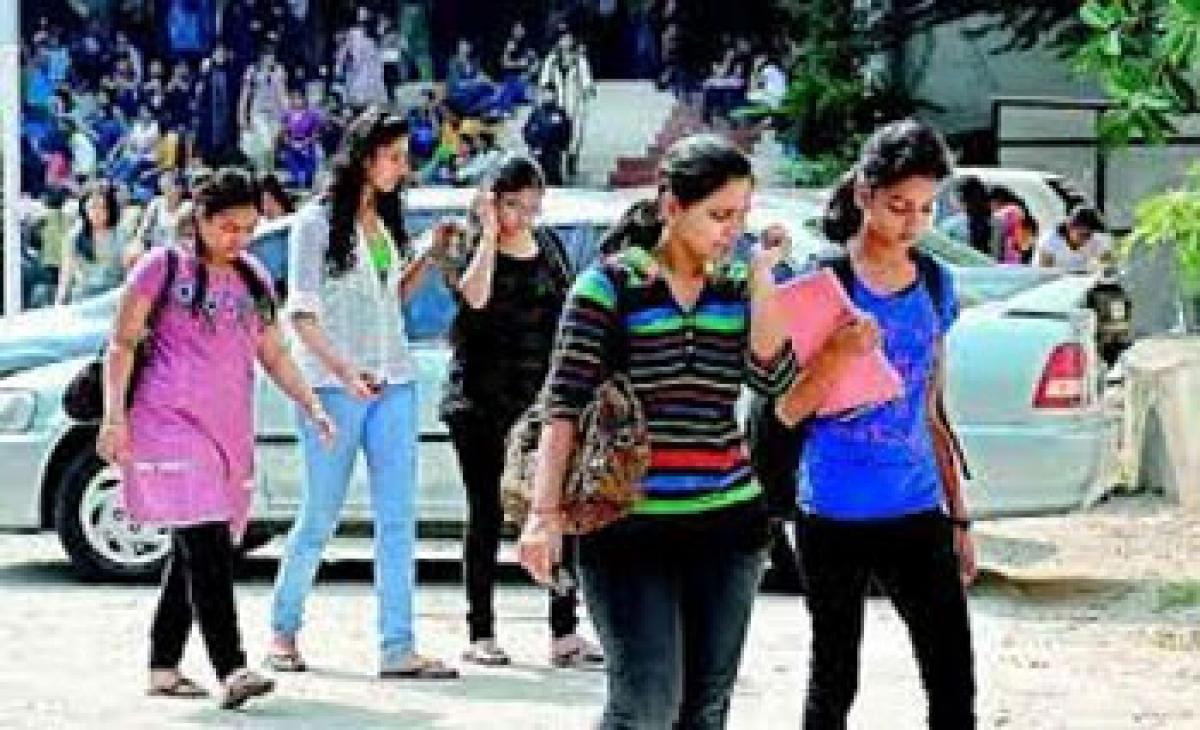Live
- ‘Kannappa’ release date announced at Shri Mahakaleshwar Temple in Ujjain
- PM Matsya Sampada Yojana opens doors of employment in Bihar’s Nalanda
- Japan's Saitama reports first bird flu outbreak this season
- ‘Srikakulam Sherlock Holmes’ to hit screens this Christmas
- ‘Mr Manikyam’ FL unveiled; promises a tale of human values
- ‘M4M’ Hindi trailer gets a grand launchat Goa IFFI
- ESA’s Proba-3 Mission Reaches Milestone with Successful Fueling, Set for December 2024 Launch
- Kejriwal tells Delhi voters to back AAP’s single-engine, shun BJP’s double-engine govt plan
- Man booked for objectionable posts on Hindu deities in Karnataka
- 'Own interpretation developed': SC trashes pleas challenging insertion of 'Socialist', 'Secular' in Preamble to Constitution
Just In

Both the Telangana and the Andhra Pradesh governments are mulling over setting up of private universities. The pronouncements made by the two Chief Ministers assume significance in the wake of ensuing meeting of the World Trade Organisation (WTO) on General Agreement on Trade in Services (GATS).
 Both the Telangana and the Andhra Pradesh governments are mulling over setting up of private universities. The pronouncements made by the two Chief Ministers assume significance in the wake of ensuing meeting of the World Trade Organisation (WTO) on General Agreement on Trade in Services (GATS).
Both the Telangana and the Andhra Pradesh governments are mulling over setting up of private universities. The pronouncements made by the two Chief Ministers assume significance in the wake of ensuing meeting of the World Trade Organisation (WTO) on General Agreement on Trade in Services (GATS).
The GATS lists education as a tradable service. But, several concerns exist in regard to establishment of private universities based on the experience earlier, which the two States have to guard against to ensure that this policy initiative would not finally end up in a fiasco.
The concerns expressed by eminent scientist and former chairman of the UGC, Prof Yashpal, in a writ petition filed in Supreme Court on the private universities in Chhattisgarh are valid even today as TS and AP embark upon permitting private universities: “The manner in which these private universities are functioning would result in creating a complete chaos in the system of higher education and the expert bodies like, University Grants Commission, Medical Council of India, All India Council for Technical Education etc. for coordination and determination of standards in their own respective fields would not be able to perform their statutory duty and would make their functioning not only difficult but almost impossible.” The decision fraught with such chaotic consequences needs to be taken with extreme caution and after wider debate.
The chapter 2 of the University Education Commission headed by Dr S Radhakrishnan said: “Universities as the Organs of Civilization... he indeed must be blind who does not see that. Mighty as are the political changes, far deeper are the fundamental questions which will be decided by what happens in the universities. Everything is being brought to the test of reason, venerable theologies, ancient political institutions, time-honoured social arrangements, a thousand things which a generation ago looked as fixed as the hills.”
Dr D S Kothari Commission said: “The function of the university is not only to preserve, disseminate and advance knowledge but also to furnish intellectual leadership and moral tone to society. The mushrooming of private universities has a potential to commodify the higher education making the universities bereft of their fundamental values.”
The proliferation of institutions does not mean elevation of standards. The market mania can create teaching shops detrimental to the standards of higher education. However, market phobia can deprive the society of quality private initiative. Therefore, indiscriminate entry of private players in university education should be discouraged. As the Supreme Court said in Osmania University Teachers Association vs. State of Andhra Pradesh, 1987, standards for higher education are of great importance to national progress.
India ranks among the countries with relatively lower Gross Enrollment Ratio (GER) in higher education and low per capita spending on this sector even when compared to countries like Malaysia or Brazil. Hence, the imperative for private participation in higher education. A summary rejection of private universities is not feasible. But, besides quality, concerns of equity in access, emphasis on only market-driven courses at the expense of other less lucrative branches of knowledge etc. need to be addressed.

© 2024 Hyderabad Media House Limited/The Hans India. All rights reserved. Powered by hocalwire.com







